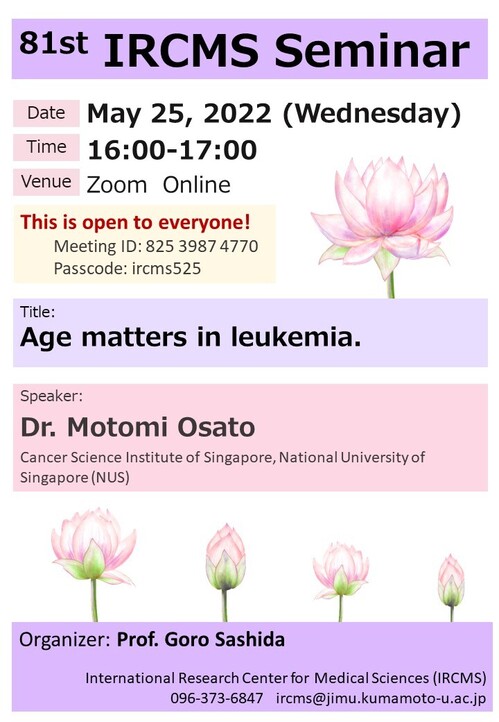- HOME
- IRCMS Seminars
- [May 25] 81st IRCMS Seminar
IRCMS Seminars
[May 25] 81st IRCMS Seminar
May 20 2022
We would like to inform you that the 81st IRCMS seminar has been scheduled as below.
* This IRCMS seminar is open to everyone.
Time and Date : May 25th, (Wed) 16:00 -17:00
Venue : Zoom online
Meeting ID: 825 3987 4770
Passcode: ircms525
Speaker : Dr. Motomi Osato
Affiliation : National University of Singapore (NUS)
Title : Age matters in leukemia.
Abstract:
Acute myeloid leukemia (AML) caused by chromosomal translocation t(8;21) is among the most common leukemia and has been extensively investigated in the field; however, its causative role remains to be proven. According to Koch's postulates, induction of a particular disease in animal models is required as a proof of causation. Although a number of attempts have been made to create its mouse model for the past 30 years, no tractable murine models have been generated. We reasoned that the failure is due to inappropriate cell-of-origin. In all earlier studies by others, the induction of its fusion gene RUNX1-ETO in the conditional models was conducted at adult stages. However, the RUNX1-ETO gene is detectable as early as in neonates and causes leukemia predominantly in adolescent and young adults (AYA). To overcome the problems in the earlier studies, we established eR1-CreERT2 system which enables the leak-free, age- and hematopoietic stem cells (HSC)-specific induction of any gene of interest, and then induced the RUNX1-ETO specifically in childhood HSCs. Interestingly, the induction of RUNX1-ETO in childhood HSCs largely caused aggressive AML with nearly complete penetrance and a short latency (2-6 months), whereas the induction in adult HSCs predominantly led to smoldering, non-cell autonomous, myeloproliferative disorder with a very long latency and/or incomplete penetrance. Malignant cells frequently exhibit granulocytic maturation with/without B cell features. Such young age-related onset coupled with cellular characteristics recapitulate clinical features in human t(8;21) leukemia, namely predominant AYA onset and association with AML M2 subtype in the FAB classification. This clinically relevant mouse leukemia model serves as a powerful platform for further molecular dissection of t(8;21) leukemogenesis and development of novel therapeutics (Abdallah, Niibori-Nambu, Morii et al., Leukemia 2021).
Flyer (Click for a larger image):

